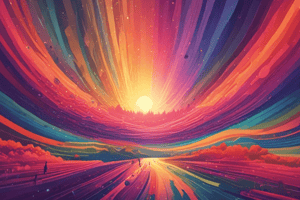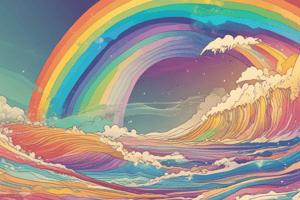Podcast
Questions and Answers
List the order of the colors in the color spectrum.
List the order of the colors in the color spectrum.
- Red, Orange, Yellow
- Green, Blue, Indigo, Violet
- All of the above
- Red, Orange, Yellow, Green, Blue, Indigo, Violet (correct)
Are black and white real colors in the sense that red and green are? Explain.
Are black and white real colors in the sense that red and green are? Explain.
No, black is the absence of light and white is a mixture of all the colors.
What is emitted by the vibrating electrons of atoms?
What is emitted by the vibrating electrons of atoms?
Electromagnetic waves.
What happens to light of a certain frequency that encounters atoms of the same resonant frequency?
What happens to light of a certain frequency that encounters atoms of the same resonant frequency?
Why does the color of an object look different under a fluorescent lamp from the way it looks under an incandescent lamp?
Why does the color of an object look different under a fluorescent lamp from the way it looks under an incandescent lamp?
What colors of light does a transparent red object transmit?
What colors of light does a transparent red object transmit?
What color(s) does it absorb?
What color(s) does it absorb?
What is the function of a pigment?
What is the function of a pigment?
Why are more and more fire engines being painted yellow-green instead of red?
Why are more and more fire engines being painted yellow-green instead of red?
How can yellow be produced on a screen if only red light and green light are available?
How can yellow be produced on a screen if only red light and green light are available?
What is the name of the color produced by a mixture of green and blue light?
What is the name of the color produced by a mixture of green and blue light?
What colors of spots are lit on a television tube to give full color?
What colors of spots are lit on a television tube to give full color?
What are complementary colors?
What are complementary colors?
What color is the complement of blue?
What color is the complement of blue?
Why do we say 'subtraction' instead of 'addition' in the case of pigments?
Why do we say 'subtraction' instead of 'addition' in the case of pigments?
What colors of ink are used to print full-color pictures in books and magazines?
What colors of ink are used to print full-color pictures in books and magazines?
What is light scattering?
What is light scattering?
Why is the sky blue?
Why is the sky blue?
Why are clouds white?
Why are clouds white?
Why are sunsets red?
Why are sunsets red?
Why is water greenish-blue?
Why is water greenish-blue?
Does the red light from glowing neon gas have only one frequency or a mixture of frequencies?
Does the red light from glowing neon gas have only one frequency or a mixture of frequencies?
Why might atomic spectra be considered the fingerprints of atoms?
Why might atomic spectra be considered the fingerprints of atoms?
Flashcards are hidden until you start studying
Study Notes
Color Spectrum
- The order of colors in the visible spectrum is red, orange, yellow, green, blue, indigo, and violet.
- Black is the absence of light, while white is a combination of all colors.
Properties of Light
- Vibrating electrons in atoms emit electromagnetic waves (light).
- Light of a specific frequency that encounters atoms of the same resonant frequency is absorbed.
Light Sources
- Fluorescent lamps emit more high-frequency (blue) light whereas incandescent lamps emit more low-frequency (red) light, affecting how colors appear under different lighting.
Color Transmission and Absorption
- A transparent red object transmits red light and absorbs all other colors.
- Pigments selectively absorb specific light frequencies and reflect others, providing their color.
Color Sensitivity
- Human sensitivity to color is highest for yellow-green, leading to its use in fire engine paint for visibility.
Color Mixing and Production
- Yellow can be produced by mixing red and green light in equal parts.
- Cyan is the result of mixing green and blue light.
Television Color Production
- Full color on a television screen is produced using red, green, and blue light, known as additive primary colors.
- Complementary colors are pairs of colors that, when combined, produce white light (e.g., blue and yellow).
Pigments and Subtractive Color Mixing
- The pigment mixing process is called subtraction because it absorbs (subtracts) certain colors from white light, rather than adding to it.
- Cyan, magenta, yellow, and black inks are used in printing to create a full spectrum of colors.
Scattering of Light
- Light scattering occurs when light is absorbed and re-emitted in multiple directions.
- Tiny particles scatter high frequencies of light while large particles scatter low frequencies, affecting atmospheric color perception.
Atmospheric Effects on Color
- The blue color of the sky results from the scattering of blue and violet light by air molecules; eyes are less sensitive to violet, making the sky appear blue.
- Whitish skies may occur due to larger particles like dust scattering lower frequencies.
- Clouds appear white because of varying droplet sizes scattering light across the spectrum.
Sunsets and Water Color
- Sunsets appear red as blue and violet light is scattered more, allowing primarily red light to reach our eyes.
- Water appears greenish-blue due to the absorption of red light, resulting in the reflection of blue wavelengths.
Spectroscopy
- A spectroscope is used to separate light into its constituent frequencies, revealing distinct lines for different elements—considered atomic "fingerprints."
- Neon gas emits light at several discrete frequencies, contributing to its characteristic glow.
Studying That Suits You
Use AI to generate personalized quizzes and flashcards to suit your learning preferences.




